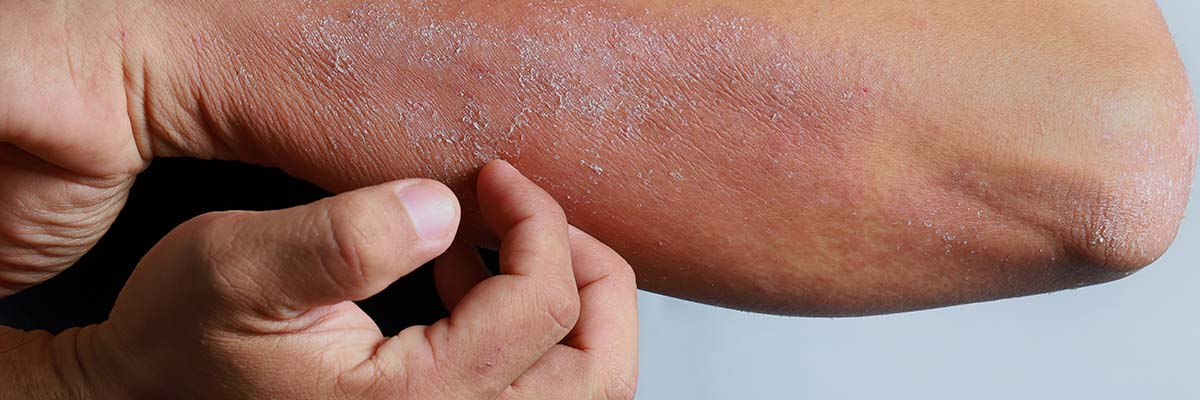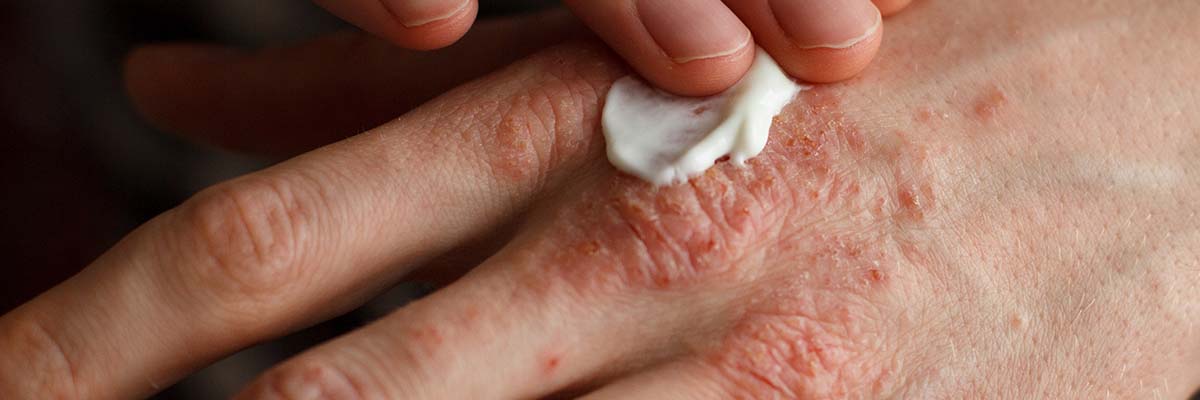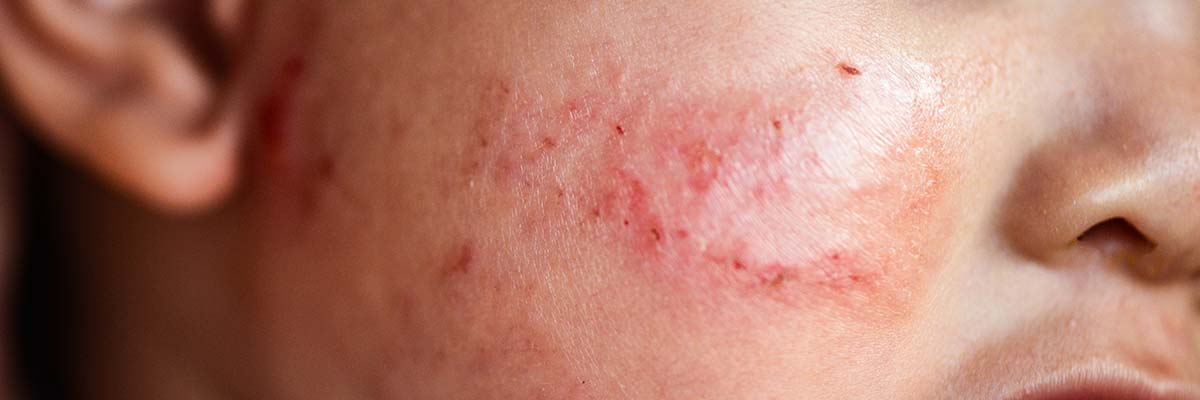Eczema, also known as atopic dermatitis, is a chronic skin condition characterised by dry, itchy, and inflamed skin. It is a common long-lasting condition that can affect individuals of any age, although it is most prevalent in children.
The exact cause of eczema is unknown, but it is believed to be a combination of genetic and environmental factors. People with eczema often have a weakened skin barrier, which allows irritants and allergens to penetrate more easily, leading to inflammation and symptom flare-ups.
Various triggers can contribute to eczema flares, including allergens such as dust mites, pollen, certain foods, and irritants such as harsh soaps, detergents, and fabrics. Stress and hormonal changes can also exacerbate symptoms.
There are several types of eczema including:
- Atopic dermatitis
- Contact dermatitis
- Seborrheic dermatitis
- Nummular eczema
- Dyshidrotic eczema.

Depending on the type of eczema you suffer from will determine the best course of action to help ease symptoms. And make living with eczema more bearable.
Proper management of eczema involves a combination of strategies, including regularly moisturizing the skin, avoiding triggers, and practicing good skincare habits.
@ampernaskin Contact dermatitis is also known as allergic dermatitis. As the name suggests, coming into contact with an allergen sets it off. The allergen causes a weeping, itchy rash on the contact area, which develops a couple of days after contact and can last for a couple of weeks afterwards. #eczem #eczemaawareness #eczema #eczemaflareup #eczemahealing #eczemacheck #eczematiktok #eczemaface #contactdermatitis #dermatitis ♬ Hey Lover - The Daughters Of Eve
Eczema Dos
Moisturise regularly
Keeping your skin well-hydrated is essential for managing eczema. Apply a moisturiser frequently, especially after bathing, to lock in moisture and prevent dryness.
Use gentle skincare products
Hypoallergenic and fragrance-free skincare products minimize irritation and reduce the risk of flare-ups.

Keep your skin clean
Take lukewarm showers or baths using mild, non-drying soaps. Avoid hot water as it can strip the skin of natural oils.
Wear breathable fabrics
Choose clothing made of cotton or other natural fibres that allow your skin to breathe. Avoid tight-fitting clothes that can cause friction and irritation.
Manage stress
Emotional stress can worsen eczema symptoms. Practice stress management techniques such as meditation, deep breathing exercises, or engaging in activities that relax you.

Eczema Don'ts
Avoid harsh chemicals
Stay away from harsh chemicals found in cleaning products, detergents, and personal care items that can irritate your skin.
Avoid scratching
Scratching can further irritate the skin and lead to infections. Use a cold compress to soothe the itch instead.
Avoid your triggers
Identify and avoid triggers that aggravate your eczema symptoms.
Avoid overheating
Excessive heat can trigger flare-ups, so avoid overheating your home and use a humidifier to add moisture to the air in dry environments.
Avoid hot showers
Hot water can strip the skin of its natural oils and worsen dryness. Take lukewarm showers or baths instead.
Ingredients that help treat eczema
Colloidal oatmeal
Colloidal oatmeal is a natural ingredient that has been proven to be beneficial in treating and relieving the symptoms of eczema. It acts as an emollient, helping to moisturize the skin and reduce dryness and itching.
Ceramides
Ceramides are lipids (fat molecules) that play a vital role in maintaining the integrity and function of the skin barrier. Using products containing ceramides can help restore and strengthen the skin barrier in individuals with eczema.
Coconut oil
Coconut oil is a natural moisturizer that can help soothe and hydrate the skin, reducing the symptoms of eczema.
Aloe vera gel
Aloe vera gel has moisturising and anti-inflammatory properties, making it a popular natural remedy for eczema. It can help soothe irritated skin, reduce redness, and alleviate itching.
Ingredients to avoid if you have eczema
Fragrances
Fragrances are commonly added to skincare products to enhance the scent. However, they can be a common allergen and may cause skin irritation in individuals with sensitive skin.
Harsh detergents
Cleansers or products containing sodium lauryl sulphate (SLS) or sodium laureth sulphate (SLES), can strip the skin of its natural oils and worsen eczema symptoms.
Preservatives
Preservatives such as parabens may cause skin irritation and trigger eczema flare-ups in sensitive individuals.

Alcohol
Products with high concentrations of alcohol, such as denatured alcohol or isopropyl alcohol, can be drying and irritating to the skin.
Certain dyes
Synthetic dyes, like red or yellow dyes, may cause allergic reactions or skin sensitivity in individuals with eczema.
@ampernaskin Do you know what type of Eczema you have? Dyshidrotic eczema In this form of eczema, blisters appear on the soles of your feet or palms of your hands. I have this form of eczema and the itching drives me insane. The tiny blisters are filled with fluid and can last anywhere from two to four weeks. The exact cause is unknown, but experts suggest it could be caused by seasonal allergies or stress. #eczema #eczemaawareness #eczemaflareup #eczemahealing #eczemacheck #eczemacommunity ♬ original sound - Amperna® Skincare


















